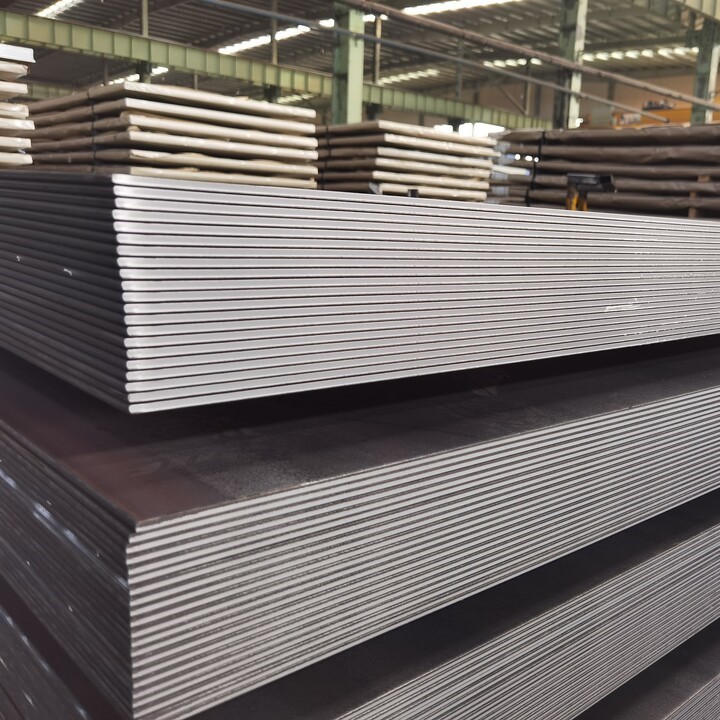EN 10028-4 Nickel Alloy Steel Plates for Pressure Vessel
EN 10028-4 Nickel Alloy Steel Plates are high-performance materials explicitly designed for pressure vessels, offering superior strength, toughness, and corrosion resistance in extreme conditions. These plates are part of the EN 10028-4 standard, which covers flat products made of weldable, fine-grain steels, and are particularly suited for applications requiring excellent low-temperature performance, such as cryogenic storage tanks, offshore oil and gas platforms and chemical processing equipment. Including nickel in the alloy enhances the steel’s durability and resistance to brittle fracture, making it an ideal choice for pressure vessels operating under high pressure and in corrosive environments. With their exceptional mechanical properties and reliability, EN 10028-4 Nickel Alloy Steel Plates ensure long-term safety and efficiency in some of the most demanding industrial applications.
Chemical Composition of EN 10028-4 Nickel Alloy Steel Plates for Pressure Vessel
| Steel Grade |
C max. (%) |
Si max. (%) |
Mn (% by mass) |
P max. (%) |
S max. (%) |
Al total min. (%) |
Mo max. (%) |
Nb max. (%) |
Ni (% by mass) |
V max. (%) |
| 11MnNi5-3 |
0.14 |
0.50 |
0.70 – 1.50 |
0.025 |
0.015 |
0.02 |
– |
0.05 |
0.30 – 0.80 |
0.05 |
| 13MnNi6-3 |
0.16 |
0.50 |
0.85 – 1.70 |
0.025 |
0.015 |
0.02 |
– |
0.05 |
0.30 – 0.85 |
0.05 |
| 15NiMn6 |
0.18 |
0.35 |
0.80 – 1.50 |
0.025 |
0.015 |
– |
– |
– |
1.30 – 1.70 |
0.05 |
| 12Ni14 |
0.15 |
0.35 |
0.30 – 0.80 |
0.02 |
0.01 |
– |
– |
– |
3.25 – 3.75 |
0.05 |
| X12Ni5 |
0.15 |
0.35 |
0.30 – 0.80 |
0.02 |
0.01 |
– |
– |
– |
4.75 – 5.25 |
0.05 |
| X8Ni9 |
0.10 |
0.35 |
0.30 – 0.80 |
0.02 |
0.01 |
– |
0.10 |
– |
8.50 – 10.00 |
0.05 |
| X7Ni9 |
0.10 |
0.35 |
0.30 – 0.80 |
0.015 |
0.005 |
– |
0.10 |
– |
8.50 – 10.00 |
0.01 |
Mechanical Properties of EN 10028-4 Nickel Alloy Steel Plates for Pressure Vessel
| Steel Name |
Usual Delivery Condition (Heat Treatment Symbol) |
Product Thickness (t) [mm] |
Yield Strength (ReH) [MPa min.] |
Tensile Strength (Rm) [MPa] |
Elongation After Fracture (A) [% min.] |
| 11MnNi5-3 |
+N (+NT) |
≤ 30 |
285 |
420 – 530 |
24 |
| 30 < t ≤ 50 |
275 |
| 50 < t ≤ 80 |
265 |
| 13MnNi6-3 |
+N (+NT) |
≤ 30 |
355 |
490 – 610 |
22 |
| 30 < t ≤ 50 |
345 |
| 50 < t ≤ 80 |
335 |
| 15NiMn6 |
+N or +NT or +QT |
≤ 30 |
355 |
490 – 640 |
22 |
| 30 < t ≤ 50 |
345 |
| 50 < t ≤ 80 |
335 |
| 12Ni14 |
+N or +NT or +QT |
≤ 30 |
345 |
490 – 640 |
22 |
| 30 < t ≤ 50 |
345 |
| 50 < t ≤ 80 |
335 |
| X12Ni5 |
+N or +NT or +QT |
≤ 30 |
390 |
530 – 710 |
20 |
| 30 < t ≤ 50 |
380 |
| X8Ni9 + NT640 |
+N +NT |
≤ 30 |
490 |
| 30 < t ≤ 50 |
480 |
| X8Ni9 + QT640 |
+QT |
≤ 30 |
490 |
640 – 840 |
18 |
| 30 < t ≤ 50 |
480 |
| X8Ni9 + QT680 |
+QT |
≤ 30 |
585 |
680 – 820 |
18 |
| 30 < t ≤ 50 |
575 |
| X7Ni9 |
+QT |
≤ 30 |
585 |
680 – 820 |
18 |
| 30 < t ≤ 50 |
575 |
Specification
| Standard |
EN 10028-4 Nickel Alloy Steel Plates for Pressure Vessel |
| Steel Grade/Material |
11MnNi5-3, 13MnNi6-3, 15NiMn6, 12Ni14, X12Ni5, X8Ni9 +NT640, X8Ni9 +QT640, X8Ni9 +QT680, and X7Ni9 |
| Dimension |
T 5-350mm × W 900-4100mm × L 3000-25000mm |
| Packing |
Packed with steel-framed plywood pallets |
| Supply Conditions |
AR = as-rolled TM = thermo-mechanical controlled processing CR = controlled QT = quenched and tempered N = normalized |
| Place of Origin |
Made in China |
| MOQ |
50 Tons/Size |
| Transportation |
Railway, By Sea |
Applications of EN 10028-4 Nickel Alloy Steel Plates for Pressure Vessel
EN 10028-4 Nickel Alloy Steel Plates are specifically designed for pressure vessels, offering excellent strength, toughness, and resistance to low-temperature environments. These steel plates are typically used in applications such as:
- Cryogenic Tanks: Due to their toughness at low temperatures, these plates are ideal for storing and transporting liquefied gases like LNG (liquefied natural gas) and LPG (liquefied petroleum gas).
- Chemical and Petrochemical Plants: The nickel content enhances corrosion resistance, making these steel plates suitable for pressure vessels that handle aggressive chemicals.
- Oil and Gas Industry: EN 10028-4 plates are used to construct offshore platforms, storage tanks, and other pressure vessels that operate in harsh and low-temperature environments.
- Power Generation: These plates are also used to manufacture boilers and heat exchangers in power plants, which must withstand high pressure and temperature variations.
- Refineries: In refineries, these steel plates are employed in various equipment, such as reactors and pressure vessels, that require high resistance to pressure and corrosive materials.




